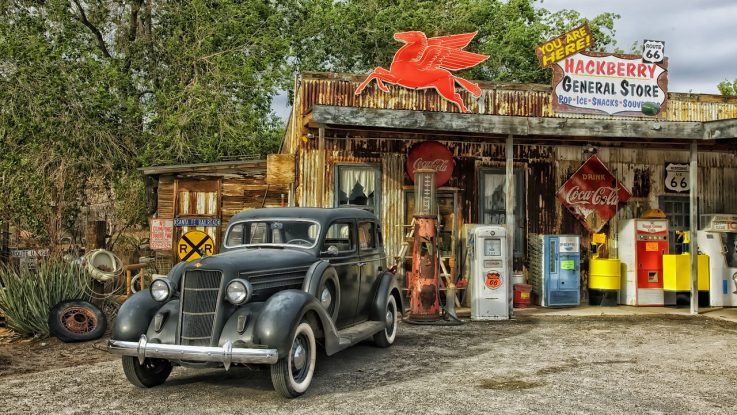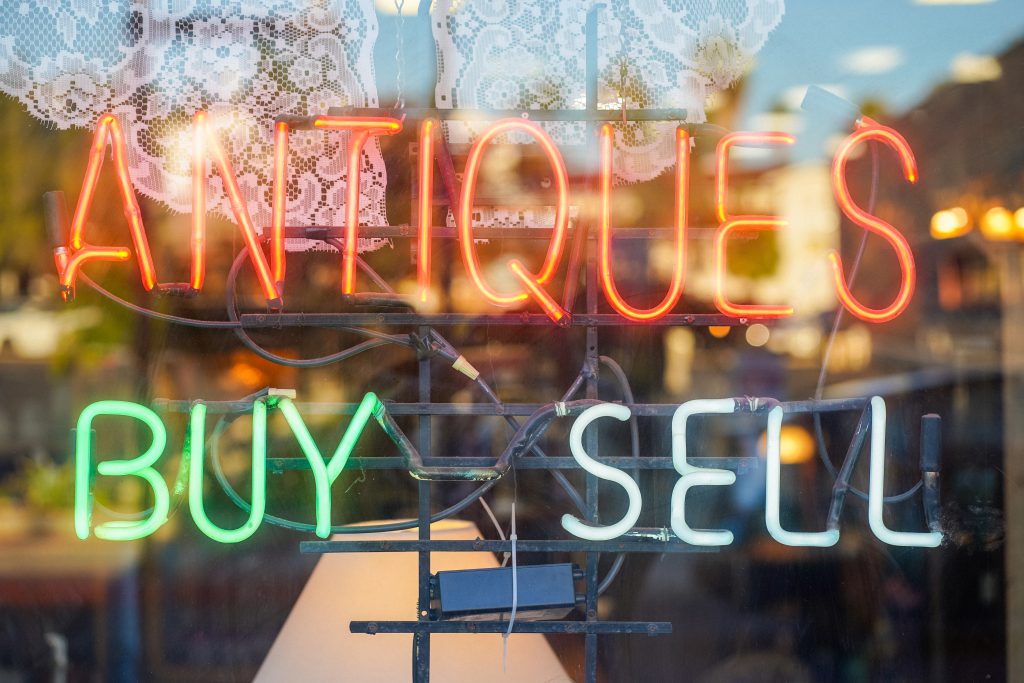
Do you swoon over dusty old treasures in antique stores and wish you could work with antiques all day? Well, it’s time to turn that passion into profit!
Becoming an antique dealer is more than just a fun hobby. It’s a thrilling career path that immerses you in history, art, and culture. Not to mention, it gives you a chance to hunt for hidden gems and share your love for antiques with others.
But where do you even start? In this article, we’ll give you the inside scoop on becoming an antique dealer and turning your devotion to antiques into a thriving business.
What Does an Antique Dealer Do?

Antique dealers buy and sell antiques, including furniture, art, jewelry, and other collectibles. They may have a physical shop where you explore their wares, run an online shop for tech-savvy shoppers, or lend their services to auction houses and museums.
Antique dealers must be very knowledgeable and up-to-date with current trends to succeed. In addition, they must be well-versed in history, art, and culture to be able to appraise and authenticate items professionally.
What’s more, antique dealers also have a knack for restoration and repair. They’re like wizards who can breathe new life into old items. They often offer appraisals or consultations for collectors or folks who want to sell their vintage treasures.
What Qualifications or Skills Do You Need to Become a Successful Antique Dealer?
While no formal qualifications are required to become an antique dealer, a few skills and traits increase your chances of success in this exciting field.
First, knowledge is power! Antique dealers must be interested in learning a lot about art history and culture. You have to know your stuff regarding historical periods and art styles, as well as the context in which the items were created.
Next up is communication and networking. Building relationships with collectors, dealers, and auction houses is essential to becoming an antique dealer. So, if you’re a social butterfly with solid communication skills, you’re off to a great start.
Third, you’ll need organizational skills. Antique dealers must keep track of inventory, research items, and manage paperwork, so strong organizational skills and attention to detail are crucial.
And let’s not forget about the art of making a deal. Successful negotiation makes a big difference in your success as an antique dealer.
Last but not least, you have to nurture your marketing and sales skills to seal lucrative deals. Marketing and selling your inventory effectively is vital in antique dealing, where the competition is fierce.
Getting Started in the Business

First, you must scope out the market. Attend antique shows, auctions, and flea markets to get a feel for what items are out there and what they typically sell for.
Next, you need to sharpen your skills and knowledge. Take courses or workshops in antique appraisal and authentication. You want to ensure you can spot a genuine antique from a fake.
Then, start small. Set up an online shop, a listing on a marketplace such as eBay, or a booth at an antique show. Sell antiques to gain experience and money. As you become more proficient and knowledgeable, build relationships with other collectors, dealers, and auction houses. They usually have valuable insider information and treasure troves to share with you.
Finally, integrate yourself within the community. Attend antique shows, auctions, workshops, seminars, and other opportunities to keep your skills sharp and stay updated with the latest trends in the antique world.
Good Learning Resources

Becoming an antique dealer isn’t just about admiring old and charming things. It takes a lot of effort and knowledge.
Immerse yourself in the fascinating world of antiques by reading up on the subject. Textbooks and guides provide an excellent stepping stone toward a fruitful career in antique and vintage items. They’ll familiarize you with the fundamentals and importance of finding, handling, and dealing with antiques.
We chose the following books as the best guide on your journey to becoming an antique expert.
“Miller’s Antiques Handbook & Price Guide” by Judith Miller is your trusty companion to everything antique-related. From furniture to ceramics, this book covers you with accurate valuations to help you develop a keen eye for authentic pieces.
Are you looking to specialize in American furniture? If yes, “The Antique Hunter’s Guide to American Furniture” by Marvin D. Schwartz is perfect for you. This remarkable book explains different styles, tells a fascinating history, and provides tips for spotting authentic pieces like a pro.
If you want to know the actual value of your cherished collectibles, then “Kovels’ Antiques and Collectibles Price Guide” by the dynamic duo Terry Kovel and Kim Kovel is an absolute must-have! With this trusty guide, you’ll never have to play guessing games again. From vintage art to classic toys, this book covers it all.
New to the world of antiques? No problem! Get ready to crash course your way into the thrilling world of antiques with the ultimate guidebook by Frank Farmer Loomis IV – “Antiques 101: A Crash Course in Everything Antique.”
Finally, all you antique enthusiasts out there shouldn’t skip “Warman’s Antiques & Collectibles” by the fantastic Ellen T. Schroy! This book is ideal for anyone who loves to collect, admire, and appreciate all things antique.
Where Do Antique Dealers Source Their Items?

Antique dealers source their one-of-a-kind finds from various places.
- Estate sales
You never know what you’ll stumble upon when someone downsizes or passes away. Antique dealers always look for unique pieces that are usually overlooked or left behind during estate sales.
- Auctions
Picture the sound of the gravel striking down on your winning bid as you snag a rare and valuable antique. Auction houses are a favorite haunting place for antique dealers, where they can find an array of exciting items up for grabs.
- Private collectors
Some collectors have so many rare and unique items they’re willing to part with a few to make room for new gems. Antique dealers know how to charm these collectors and persuade them to part with their prized possessions.
- Other dealers
It’s a dog-eat-dog world out there, and antique dealers are not afraid to buy from their competitors. They know building a solid inventory from various sources will appeal to their customers.
- Traveling to exotic places
Some antique dealers take their passion for antiques to the next level by traveling to other countries or regions to find that unique piece that no one else has.
Common Mistakes to Avoid
Setting sail into the exciting world of antique dealing can be a real adventure, but beware of hidden obstacles along the way.
Failing to Do Proper Research
One of the biggest mistakes that rookie antique dealers make is not researching enough before making purchases. Getting swept up in the excitement of discovering new treasures is easy. Still, without understanding the market, the value of items, and their condition, you may end up overpaying or struggling to sell antiques for a profit.
There’s a simple solution to avoid this pitfall: research, research, research! Hit the books and consult antique pricing guides, attend seminars and workshops, and don’t be afraid to seek advice from experienced dealers. The more knowledge you have, the better equipped you’ll be to make savvy buying decisions and avoid costly mistakes.
Not Building Business Relationships
Another common pitfall is failing to build relationships. Antique dealing is a relationship-based business, and if you don’t build relationships with other dealers, collectors, and customers, you’ll struggle to make sales and grow your business.
So, make a conscious effort to network and build relationships within the antique community. Attend antique fairs and shows, join local antique associations, and participate in online forums and groups. By building relationships with others in the industry, you’ll have a better chance of finding new customers and sourcing quality items for your inventory.
Underestimating the Costs
Underestimating the overhead cost is also a common mistake among newbies. Rent, utilities, insurance – all expenses need to be factored into your business plan and pricing strategy to ensure you’re making a profit.
So, create a comprehensive business plan outlining your expenses and projected income. Then, take the time to research rental costs, insurance, and other fees before setting your prices. Remember that your pricing strategy should not only cover your expenses but also allow for a reasonable profit margin.
Doing Too Little Marketing
Lastly, neglecting marketing efforts is another mistake new antique dealers make. It’s easy to assume that customers will come flocking once you have quality items in stock, but unfortunately, this is not always the case.
So, make marketing a priority. Develop a marketing plan that includes social media, online marketplaces, and email marketing. Attend antique shows and fairs to showcase your items and build brand awareness. If you want to see your business blossom, you must put in the time and effort for marketing. It’s not just some random task on your to-do list, it’s an essential ingredient for growth and success!
Conclusion
So there you have it, our fellow antique aficionados, your ultimate guide to becoming an antique dealer!
We hope this article has inspired you to take the leap and turn your passion for antiques into a profitable and fulfilling career. Remember, it’s not just about loving old things. It takes skill, knowledge, and dedication to succeed as an antique dealer. But with these tips, you’ll be well on your way to becoming a pro in no time.

Leave a Reply